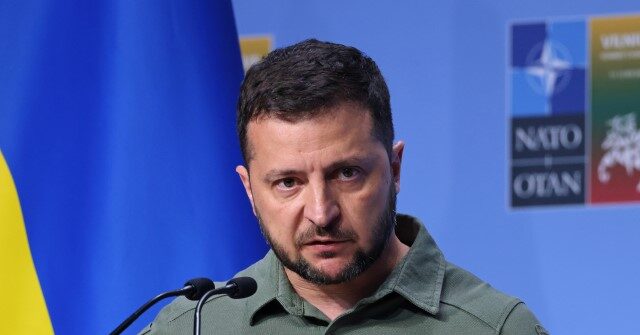Ukrainian President Volodymyr Zelensky’s exasperated complaint about the slow pace of an invitation for his country to join NATO, delivered as the annual NATO summit began in Vilnius, Lithuania, may have actually moved the process backward by alienating the United States and allied leaders, the Washington Post claimed this week, citing unnamed sources.
Zelensky on Tuesday called it “unprecedented and absurd” for NATO to speak vaguely about inviting Ukraine to join without setting a time frame and to add “conditions” by demanding political reforms not demanded of the two newest alliance members, Finland and Sweden.
“Ukraine also deserves respect,” Zelensky fumed, blaming NATO’s hesitancy for giving Russia “motivation to continue its terror.”
“Uncertainty is weakness,” he concluded.
Some NATO leaders were publicly annoyed by Zelensky’s outburst. British Defense Secretary Ben Wallace on Wednesday said a “slight word of caution” was in order for the Ukrainian president, and suggested he try showing a little “gratitude” if he expected allied countries to “give up their stocks” of weapons to defend his nation.
Zelensky did express gratitude to the U.K. for “decisions taken to provide our country with long-term financial support” soon after Wallace criticized him, but according to the Washington Post on Thursday, the Biden White House was so miffed by Zelensky’s complaints that it “considered scaling back the ‘invitation’ for Kyiv to join” NATO.
What NATO actually did at the conclusion of the Vilnius summit was declare that “Ukraine’s future is in NATO” and promise that Kyiv will be invited at some undetermined point in the future, which is precisely the approach that made Zelensky angry.
“We will be in a position to extend an invitation to Ukraine to join the alliance when allies agree and conditions are met,” the Vilnius communiqué said.
The Ukrainians believe full membership, with its commitment to collective defense, could have prevented Russia from invading, and full membership now might make the Kremlin back down instead of risking a world war, although some Ukrainian officials have conceded that processing a membership application while Russian troops are fighting on Ukrainian soil might not be feasible. At one point, Zelensky threatened to boycott the Vilnius summit unless a firm timetable for Ukrainian membership was put forward.
The Washington Post’s inside sources said the NATO leaders gathered in Lithuania were “stunned” by Zelensky’s public rebuke, and the United States delegation was downright “furious.”
United States officials suggested “watering down” or even eliminating the murky “we will be in a position to extend an invitation to Ukraine to join the alliance when allies agree and conditions are met” line. The word “invitation” was reportedly on the chopping block for a while, but after some “frantic negotiations” among NATO diplomats, the alliance decided to stick with its original wording.
“By the time NATO ambassadors formally discussed how to respond to Zelensky’s tweet, the United States was back on board with the declaration’s original wording,” as one source put it.
Another NATO policymaker said of the hours following Zelensky’s public criticism: “It was not fun.”
An unidentified senior diplomat told CNBC on Thursday that there was a “very clear message from the U.S. side” to Ukraine that “you went too far.”
“The summit outcome reflects the basic reality that NATO is a U.S. security commitment to, as the strongest military power in the world, defend other eligible countries. Hence NATO will always only move at the speed of Washington, which right now is fixated on China in the long run,” German Marshall fund senior fellow Jaco Kirkegaard told CNBC.
Zelensky fired off a string of Twitter posts after departing Vilnius that each contained the words “grateful” or “thanks,” suggesting a desire to put the controversy behind him:
We are fighting for freedom and independence for Ukraine. For dignity, for the right to life for all our people, all over Ukraine. Ukraine will always be grateful to everyone who fights for it. To our soldiers. To our heroes. pic.twitter.com/VrwmFZkW2L
— Володимир Зеленський (@ZelenskyyUa) July 14, 2023
We continue our very successful agreement on security guarantees for Ukraine on its way to NATO by preparing treaties with countries… bilateral treaties. Only a day after Vilnius, six countries have already joined the seven largest democracies of the world with which we agreed… pic.twitter.com/Iv8ADqpIJu
— Володимир Зеленський (@ZelenskyyUa) July 13, 2023
Biden administration officials likewise gave interviews on Thursday and Friday in which they invariably said Ukraine will definitely become part of NATO once the Russian attack is over.
“I have no doubt that that will happen, and we heard all the countries in the room say as much,” Secretary of Defense Lloyd Austin said of Ukrainian membership in an interview on Thursday.


